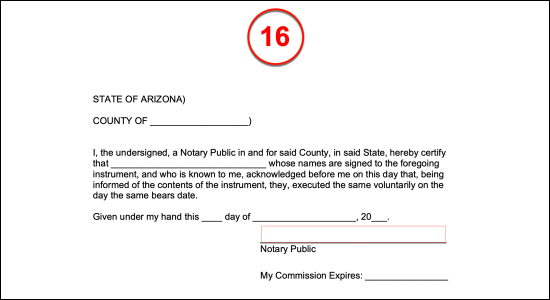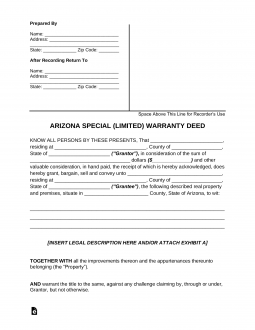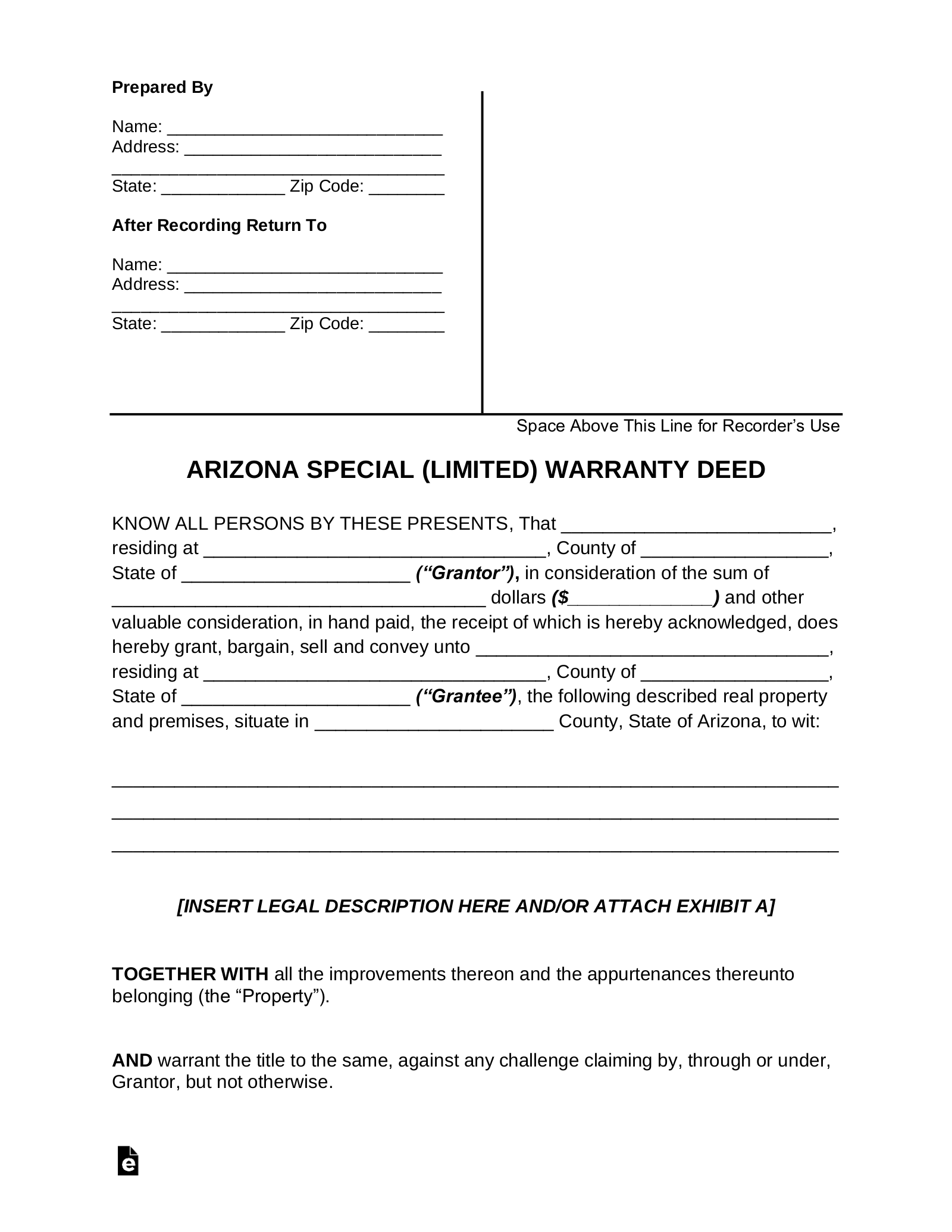Updated September 19, 2023
An Arizona special warranty deed is used by a seller (grantor) to transfer a piece of property in Arizona to a buyer (grantee). This deed conveys the interest of the purchaser to a buyer in the property but does not warrant against claims to the property by others. It is important that the seller’s husband or wife, if married sign the deed as well to make sure that there is no interest retained by the spouse. Types of interests a spouse may have could be a homestead interest or a joint interest. The document should be signed in front of a notary and the buyer will take the original to the recorder to record.
Laws – Title 33 (Property), Chapter 4 – Conveyances and Deeds
Affidavit of Property Value – Required when filing with the County Recorder’s Office, that is, unless the ownership change is occurring with no monetary payment (i.e. gifts, heirship, divorce agreement, etc.).[1]
Statutory Form – Forms for conveyances[2]
Signing – Notary Public.[3]
How to Write
Download; PDF (.PDF), Microsoft Word (.Docx), Open Document Type (.ODT)
I. Preparer Of Arizona Special Warranty Deed
(1) Preparer Of Arizona Document. In many cases, a Preparer will work to satisfy the information needed for the statement this document makes. If this release of ownership on the Arizona property will be developed by such an Individual, then furnish the full name of this Preparer as well as his or her professional mailing address to the first area of this document’s header.

II. Recorded Paperwork Recipient
(2) Recipient Of Arizona Paperwork. Once the Arizona County Recorder’s Office makes a formal record of this document with the County, the Recorder will seek to return the submitted and filed paperwork. The Party the Grantor wishes to receive this package should be identified by name and address. This can be any Party that the Grantor (Real Property Seller) and Grantee (Real Property Buyer) agree to be a Recipient. It should be noted that oftentimes, the Recipient of such a filing is the Grantee since he or she will require this document as proof of the current Owner’s release of the Arizona property.

III. Arizona Statement Of Conveyance
(3) Grantor Identity. The Arizona Grantor is the Party who shall sign this document to prove his or her release of the property located in the State of Arizona. As mentioned earlier, this paperwork will only represent the current Arizona Property Owner’s release of ownership however this can only be done if every Grantor making this document is named to this role in the first area provided. If more room is needed then compose an attachment with the full name of every Grantor releasing the Arizona property.

(4) Street Address Of Arizona Grantor. The identity of every Grantor of Arizona property named in this statement should be supported with his or her residential street address (building number/street/unit number).
(5) Arizona County And State Of Grantor Residence. The Arizona Grantor may not live in Arizona. He or she only needs to have a claim on Arizona property. Therefore, furnish the County and State where the Arizona Grantor’s home address is found.

IV. Required Payment For Arizona Real Property
(6) Dollar Amount Required For Payment. The release of Arizona real property will usually occur only when the Grantor (Arizona Seller) has received payment. Write out the payment that the Grantor or Arizona Seller required to release ownership of the property.
(7) Confirm Payment Amount. Resubmit the required payment amount numerically in the parentheses space.

V. Grantee Receiving Arizona Property
(8) Arizona Grantee Identity. The Purchaser of the Grantor’s interest or ownership in the Arizona Property should be identified as such in the statement made. Produce his or her full name to this document. As with the Grantor, every Party who should receive the current ownership and interest in the Arizona real property through this paperwork should be listed as the Grantee even if additional space must be inserted or if an attachment must be developed.

(9) Street Address Of Arizona Grantee Home. Continue through this statement with a record of the Arizona Grantee (or Purchaser) home street address. This will require a record of the building number and street of the Arizona Grantee’s home address along with any apartment number or unit number needed to access this residence in person.
(10) County And State Of Arizona Grantee Residence. Complete the residential address of the Arizona Grantee by producing the name of the County where it is found then the name of the State.

VI. Arizona Property Description
(11) Arizona County Of Property. Now that the Grantor(s) and Grantee(s) have been identified, it will be time to focus on the concerned Arizona property. To this end, name the Arizona County where the Grantor’s property is located.
(12) Legal Description Of Arizona Real Property. Produce both the physical address and the legal description of the Arizona property whose ownership is transferred through this document. If the legal description is not readily available, it may be obtained from the County Recorder’s Office or the County Assessor’s Office governing the area where the real property is located.
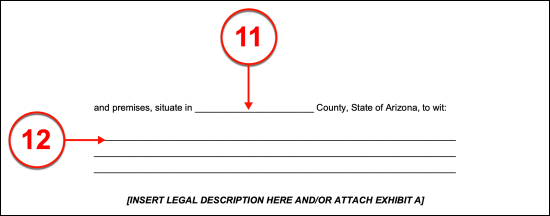
VII. Arizona Grantor Execution
(13) Signature Requirement. This paperwork can only function through the signature of the Grantor (Seller). Therefore each Grantor (Seller) of the Arizona property that is expected to transfer his or her ownership and interest in the concerned real estate must sign his or her name.

(14) Printed Name Of Arizona Grantor. The Signature Grantor is required to print his or her name after signing it.
(15) Arizona Grantor Address. The complete residential address of the Arizona Grantor should be presented during his or her signature process.
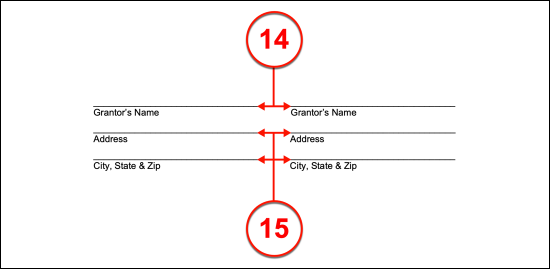
VIII. Notary Acknowledgment of Arizona Grantor Action
(16) Notary Public Authentication. The signature of the Arizona Grantor(s) must be proven as authentic to as reliable a degree as possible. Therefore, this document’s execution should be performed under the observance of a licensed Notary Public.
